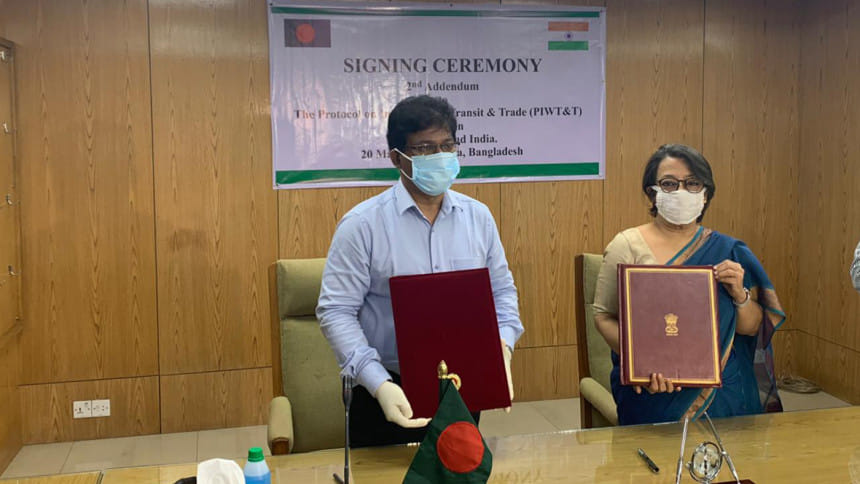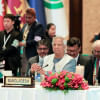Bangladesh, India add 5 more ports of call

Bangladesh and India have added five more ports of call that would augment the trade and provide a stimulus to the economic development of the new locations and their hinterland.
The five new ports of call in Bangladesh side are Rajshahi, Sultanganj, Chilmari, Daudkandi and Bahadurabad, while in Indian side are Dhulian, Maia, Kolaghat, Sonamura and Jogigopha.
Bangladesh's Shipping Secretary Mezbah Uddin Chowdhury and Indian High Commissioner to Bangladesh Riva Ganguly Das signed the Second Addendum to the Protocol on Transit and Trade at the shipping ministry today.
Under the protocol, presently there are six ports of call. They are Kolkata, Haldia, Karimganj, Pandu, Shilghat and Dhubri on Indian side and Narayanganj, Khulna, Mongla, Sirajganj, Ashuganj and Pangaon on Bangladesh side.
Further, two more extended ports of call – Tribeli ( Bandel) and Badarpur on Indian side and Ghorasal and Muktarpur on Bangladesh side – have been added through this addendum. Now, total ports of call are 11 and there are two extended ports of call in both countries.
"Inclusion of Jogigopha in India and Bahadurabad in Bangladesh as a new Port of Call will provide connectivity to Meghalaya, Assam and Bhutan. Jogigopha also becomes important, since, a multimodal logistics park is proposed to be established there," said Indian High Commission in a statement.
The Protocol on Transit and Trade through inland waterways of India and Bangladesh, which was first signed in the year 1972, was last renewed in 2015 for five years with a provision of its automatic renewal for a further period of five years.
During the discussions between India and Bangladesh at shipping ministry level meetings held in October, 2018 in New Delhi and in December, 2019 in Dhaka, key decisions were taken on the extension of protocol routes, inclusion of new routes, and declaration of new ports of call to facilitate trade between the two countries.
These decisions have been made effective with the signing of Second Addendum to the Protocol. The number of Indo-Bangladesh Protocol (IBP) routes is being increased from 8 to 10 and new locations are also added to the existing routes.
The operationalisation of Rajshahi-Dhulian-Rajshahi route and its extension up to Aricha (270 km) will help the augmentation of infrastructure in Bangladesh as it would reduce the transportation cost of stone chips/aggregate to northern part of Bangladesh through this route. Further, it will also decongest land custom stations on both sides, said the statement.
Indian High Commission said as a path-breaking development, both sides have agreed to introduce trade between Chilmari (Bangladesh) and Dhubri (India) through the use of shallow draft mechanised vessels.
This initiative will allow export of stone chips and other Bhutanese and Northeast cargo to Bangladesh and easy access for the traders to the hinterland of Bangladesh, enhancing the local economy in Bangladesh and the lower Assam region of India.
Under this Protocol, inland vessels of both the countries can ply the designated protocol route and dock at ports of call in each country, notified for loading / unloading of cargo.
"There has been significant improvement in the movement of cargo vessels in an organised manner on the protocol route carrying both the transit cargo to Northeast region of India and vice-versa and export-cargo to Bangladesh," it said.
The Indian transit cargo is mainly coal, fly-ash, POL and ODC for power projects in Northeast region. The other potential cargo for movement is fertilisers, cement, food grains, agricultural products, containerised cargo etc.
On the other hand, the export cargo from India to Bangladesh is mainly fly-ash, which is to the tune of 30 lakhs MT annually. Around 638 inland vessels (including 600 Bangladeshi flag vessels) completed with approximately 4000 loaded voyages annually.
"It is expected that these additions to the protocol will greatly facilitate the bilateral trade, with improved reliability and cost effectiveness for the business community and the people of both the countries," Indian High Commission said.
Excellent connectivity provided by the existing and the newly added protocol routes is all the more pertinent in the present Covid-19 scenario as it will be instrumental in providing economical, faster, safer and greener mode of transport, it said.

 For all latest news, follow The Daily Star's Google News channel.
For all latest news, follow The Daily Star's Google News channel. 








Comments